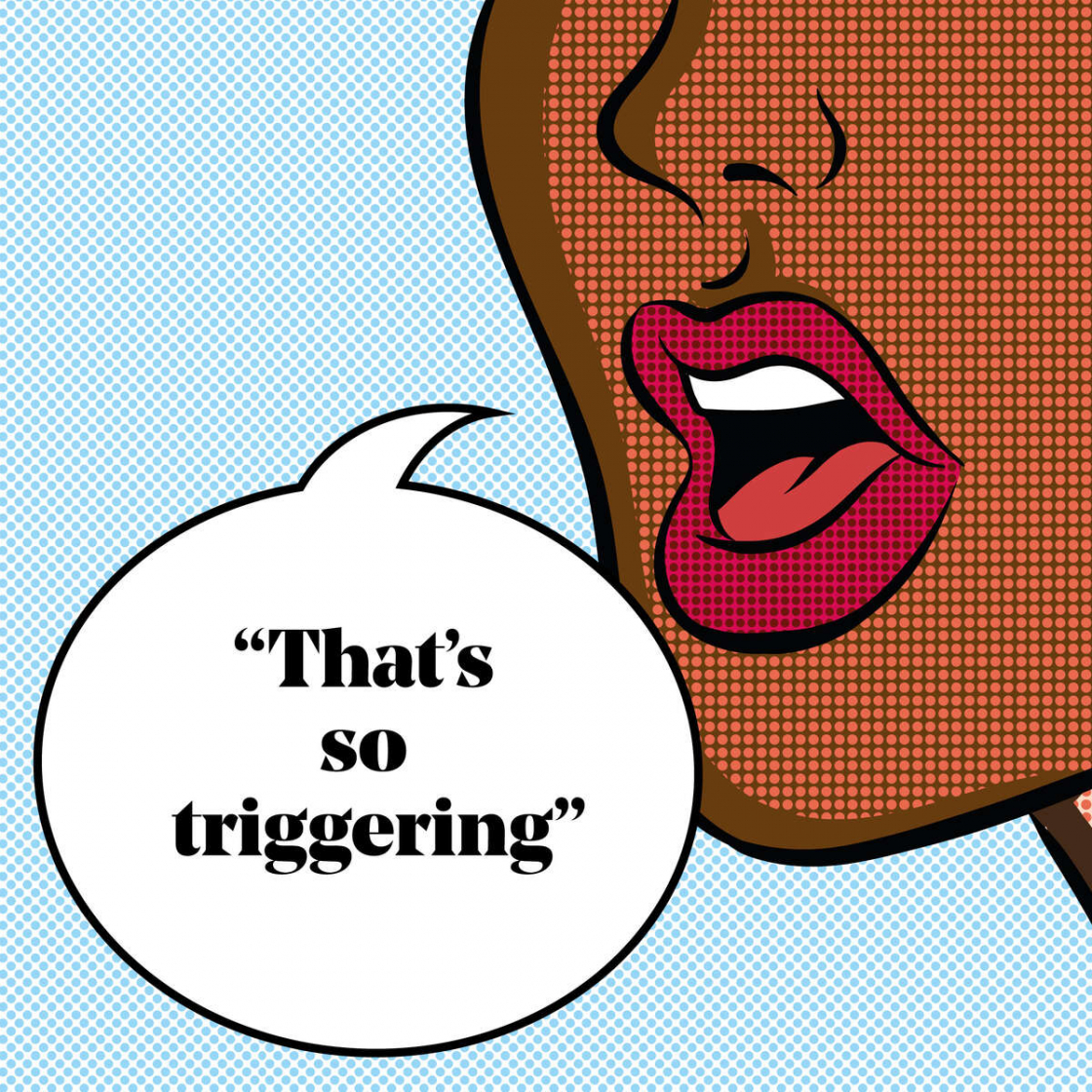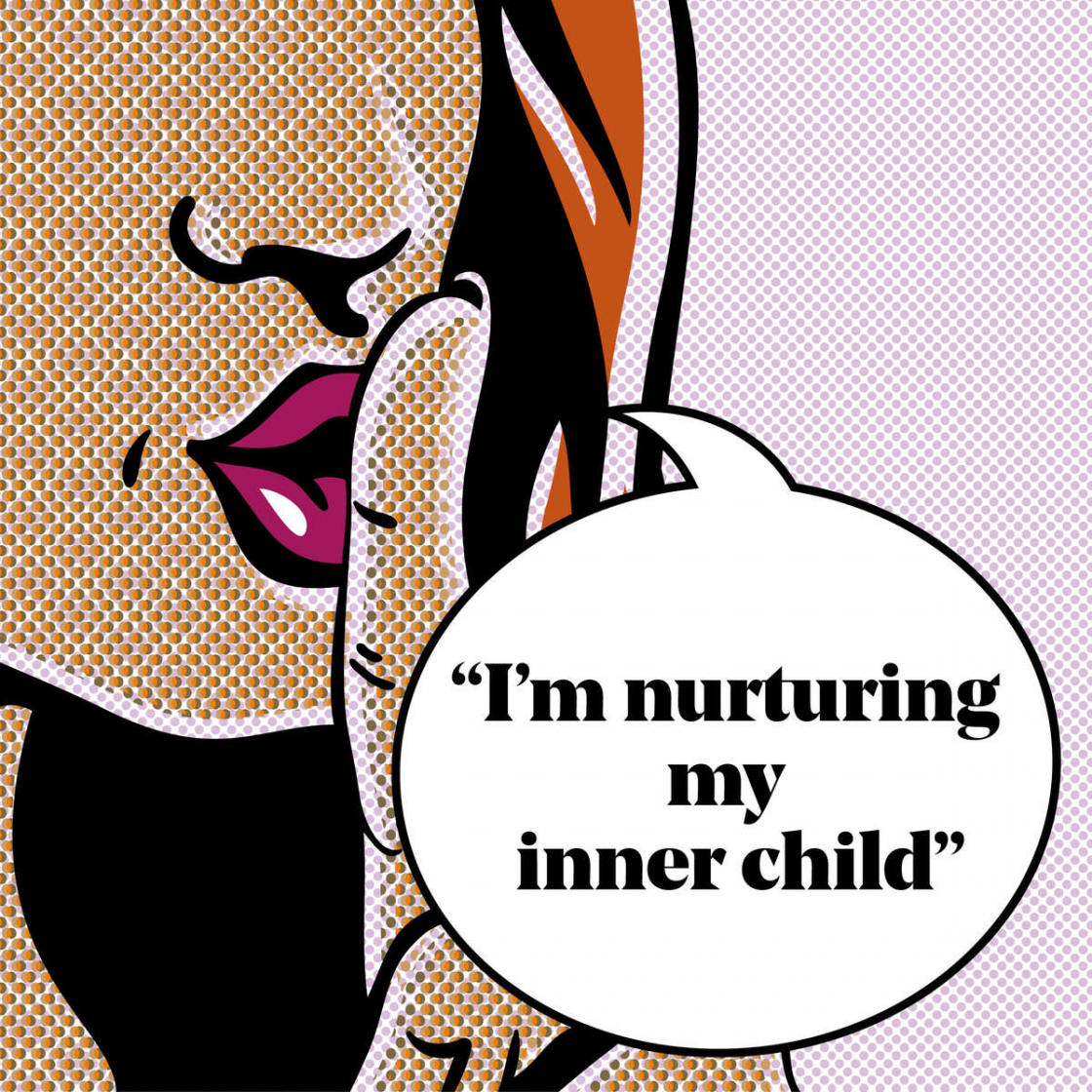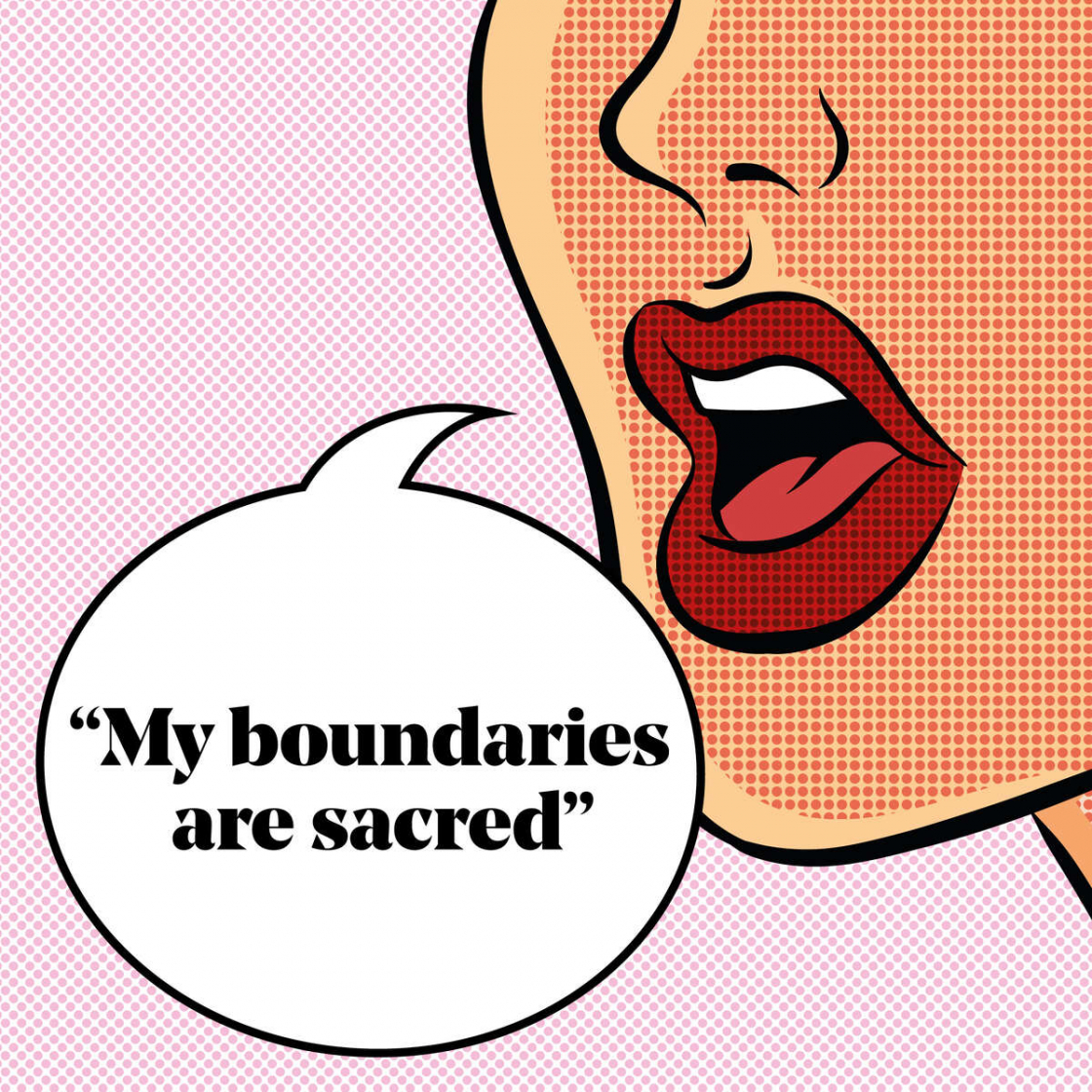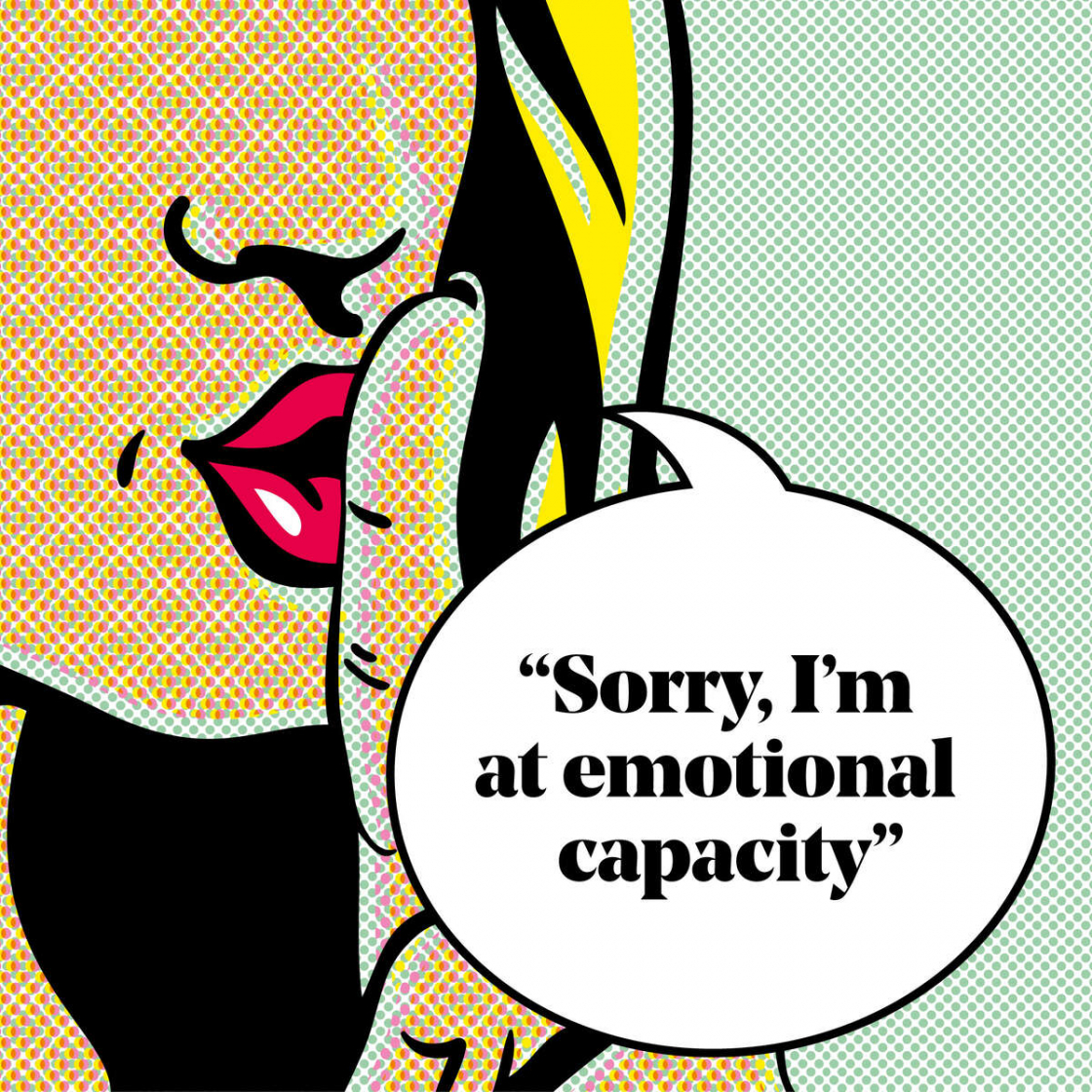Written by Marianne Eloise
With terms such as “triggered” and “trauma” fast becoming part of our collective vocabulary, Stylist explores what’s behind the rise in language usually reserved for the therapist’s couch.
Lately, you might have noticed clinical-sounding speech is showing up everywhere. You could be in a brainstorming session at work when you’re told it’s a “safe space”. Or perhaps you’ve been invited to “nurture your inner child” as you squirm in downward dog during a yoga class? Maybe a friend has told you they’re worried about their “avoidant attachment style”, a phrase you’ve had to take your phone out to google.
“Therapy-speak” (language usually reserved for a psychologist’s office) has infiltrated our everyday conversations: where we were once “pissed off” or “hurt”, we now feel “gaslit” or “triggered”. We “set boundaries” rather than take some alone time. A friend who circles a conversation back to themselves constantly is a “malignant narcissist”. While it’s often simple hyperbole (being late for a morning meeting due to a crammed train will not, of course, bring on actual PTSD), there are also instances where it’s born from a genuine attempt to understand the human experience. But how has this happened? And can it do more harm than good?
To understand its impact, we must first look at where it’s come from – and how it’s grown alongside an uptake in therapy. During the pandemic, psychologists reported a major increase in demand for mental health treatment, with three in 10 saying they were seeing more patients than they were before. Women are more likely than men to receive mental health treatment, with 11.7% of them attending therapy in 2019. Simply put, if you or the people in your friendship group are attending therapy, the language that you use for that ever-important hour of the week might filter into your day-to-day conflicts and conversations. In recent months, therapist Kathryn Kline has been struck most by clients using this language of their own accord. “I try to keep sessions jargon-free because I believe too much terminology can intellectualise the therapeutic experience,” she says. “It can prevent people from working through relational issues that could in fact be resolved. If everyone I disagree with is a narcissist, why try to resolve problems in the relationship?”

The data certainly backs up the trend for reaching for this language to better understand our relationships: a new survey into the top mental health terms of the moment by Thriveworks, a therapy provider, found that “gaslighting” (which made a 1,020% jump in mentions from 2016), “love-bombing” and “trauma-bonding” are currently the most popular. Surprisingly, this shift has happened quickly. According to Jennifer McDermott, the head of PR at Thriveworks, only two entries from 2021’s top 10 (specifically, “stress” and “recovery”) would have made the top 10 in 2016.
Even if you’re not in therapy, it’s hard to escape it. This kind of language has filtered into the media that we consume: podcasts such as Susie Orbach’s In Therapy and Esther Perel’s Where Should We Begin? take listeners inside real therapy sessions as silent observers, giving them the opportunity to eavesdrop. Meanwhile, Instagram pages like The Holistic Psychologist and Lisa Olivera offer bite-sized insights into the human psyche, with neat, colourful slides offering guides to everything from overcoming trauma to spotting emotional abuse. And over on TikTok, mental health professionals such as Dr Julie Smith and Lindsay Fleming give fans convenient ways to better understand ourselves and others. In one, Smith dances to Olivia Rodrigo while pointing at signs of a “highly sensitive person” – symptoms such as “you feel emotions intensely” are so broad it’s no surprise thousands of people find themselves identifying with them.
These influencers-cum-mental-health-professionals are a little like Frasier, only with better hair. The ubiquity of these catchy formats explains why we can’t stop regurgitating therapy-speak, even when it isn’t appropriate.

Like all evolutions in language, therapy-speak came about gradually, and then all at once. Amanda Montell is a linguist and the author of Cultish: The Language Of Fanaticism, who studies the evolution of language, particularly how it relates to women. She is less inclined to find the casual use of therapy-speak helpful. “I’ve seen a rise in this sort of ‘psychobabble’ on social media,” says Montell. “People will toss around terms like ‘gaslighter’ and ‘narcissist’ so much they start to lose their meaning,” she says. That popularisation, she adds, can be “weaponised and exploited to benefit certain mental health influencers who are claiming to have expertise on these matters, particularly trauma”. While she is suspicious of “practising influencers” who appear to take the place of real, accredited mental health work on social media feeds, she understands the impulse.
Interestingly, Montell sees a link between “cultish” language – the lexicon used to initiate people into cults and cult-like groups – and this new sphere. “This language has emerged in all kinds of sectors of modern life, from boutique fitness and yoga studios to social media wellness accounts,” she says. “They combine mystical, holistic-sounding terminology that has spiritual undertones with these mental health terms.” She adds that this is particularly prevalent on social media: “There are a lot of mental health influencers who will use a term like ‘trauma’ in the same sentence as new age terms like ‘awakening’ or ‘self-actualise’.” Montell believes that, increasingly, people are looking to culture and social media “therapy influencers with a cult-like following” to get their information, solace and comfort. While this isn’t always a bad thing, she believes that over time it could become dangerous. “Technical terms from psychology will be bastardised or recontextualised, and they’ll no longer be fit for use as medical terms,” she explains.

This is something Cate, 33, who is in therapy for complex PTSD can relate to. “I can use therapy-speak as a shield,” she says. “If I say the clinical words then I don’t have to say the emotional ones and feel what’s really going on.” Similarly, Lucia Osborne-Crowley, author of My Body Keeps Your Secrets, a manifesto on trauma, says that she’s hearing more people use the word “triggered” inappropriately, “like it’s almost become synonymous with anything people find mildly offensive”, she says. While Osborne-Crowley is a fan of therapy-speak finding its way into popular discourse when used appropriately, she struggles when it’s applied out of context: “‘Triggered’ is a very specific term that relates to post-traumatic stress disorder and I, personally, find myself feeling pretty uncomfortable as someone who is genuinely vulnerable to being triggered,” she says. “It really feels like it undermines a concept I’ve worked hard to understand.”
For Amy, 35, a trainee counsellor, therapy-speak throws up problems when it seeps into casual conversations without purpose. “I use terms like ‘boundaries’ and ‘processing’ and ‘abuse’, rather than just labelling someone a dickhead!” she laughs. “But sometimes, my friends just need to moan rather than being therapised.” Generally, though, she finds it helpful. “A lot of us aren’t taught the vocabulary of emotions, feelings and healthy relationships, and that means, when we hear these terms, they feel alien and maybe threatening,” she adds.

From a psychological perspective, its usefulness isn’t something professionals agree on. Some worry mass use could devalue these terms, leaving them useless. While others, such as Kline, acknowledge that therapy-speak allows some patients to “go there” with their emotions. “I’ve seen individuals feel freer and become more self-compassionate after learning about psychological terms like ‘trauma’ because they can categorise their experiences as such,” she explains. Similarly, psychotherapist Somia Zaman believes naming these issues cultivates openness around discussing trauma more generally. “When a mass of people is no longer shying away from discussing their mental health, this, in turn, helps others to open up and diminishes stigma,” she says.
There’s no denying that the overuse of this language is indicative of more of us feeling comfortable talking about our mental health – and that’s definitely a good thing. But reaching for these terms in the wrong contexts, be it a disagreement with friends at the pub or a Twitter fight, can make your relationships feel overly clinical and studied. Who wants to be told they’re a “malignant narcissist” when they’re just being a bit of a rubbish friend? Perhaps, then, the answer is to ask ourselves if the conversation we’re having warrants therapy-speak before we alienate our loved ones. Do I need to just be a friend right now? Am I using this term in the right context? Am I qualified to say this? And, maybe, sometimes, a dickhead is just a dickhead.
Images: Getty
Source: Read Full Article